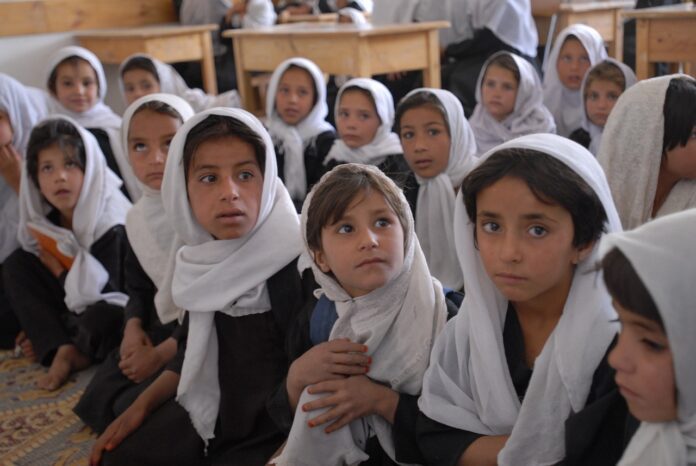By Musfirah Rashid
Since the fall of Kabul, the most affected solitaries are the women residing in Afghanistan. Soon after taking control, the Taliban regime announced that they are committed to upholding the rights of women and girls under Sharia Law. But the on-ground picture differs from the mere words. The human rights of Afghan women discern a brutal clampdown under Taliban control.

The basic rights to education, freedom of movement, and freedom to work are grossly violated. The Taliban government barred young girls to return to their schools and closed all the girls’ schools within the state. Women are also banned from universities. According to the UN Women report 80% of secondary school girls were banned till April 2022 and 84% of women journalists were forced to stop working. Afghanistan is ranked at the bottom out of 156 countries on the Global Gender Gap index. The de facto government has disbanded the Ministries working for women and does not have any female cabinet members, depicting the marginalization of women’s political participation. They eliminated the Ministry of Women’s Affairs and Human rights commission in Afghanistan.
The Taliban also hindered Afghan Women to work and forced them to stay at home. Laying off women from private sectors to cage them and opting for the policy structure to regulate the behavior and dress code of those working in the health and education sector. Women are not allowed to move without any mahram and are also ousted from public spaces.
Another prevailing issue under the Taliban regime is gender-based violence. Prior to Taliban control women in Afghanistan had access to nationwide assistance and shelter in response to the violence. They had rights to legal, medical, and psychological counseling, and specialized courts to deal with women’s issues. But the system busted under Taliban rule and forced women to stay in abusive relationships.
The horror did not end there. On 6th March 2023, the Taliban regime announced the annulment of all the divorces taken by women under American rule and also banned women from getting a divorce (Khula) from now on. Women who got divorced under a US-backed government on the premise of abusive marriages feel terrified and violated by the law. Taliban are forcing women to go back to their toxic and abusive partners to continue their marriages.
The Taliban policies contradict their claims of upholding the Sharia Law and Islamic Values. The issue of divorce is seen as taboo than the issue of abuse itself. It is a myth propagated by the societal stigma that a woman cannot divorce her spouse under Islamic law. In Islamic Law, women have the right to get a khula from their abusive patterns. It is a fundamental right endowed to women by the Holy Quran and is enshrined in the nikkahnama as well. Khula draws its validity from Surah 2:229, 4:35, and Jameela Hadis. According to Surah 2:229, “But if you fear that they will not keep [within] the limits of Allah, then there is no blame upon either of them concerning that by which she ransoms herself”. Even in his life, Prophet Muhammad (PBUH) allowed divorces for women who no longer want to live with their abusive partners.
Exploiting religion just to further their cause is quite alarming. Forcing women to go back to their divorced husbands is similar to forcing them into adultery which is a forbidden deed in Islam. It’s high time that the regime reviews its so-called Sharia law and Islamic values to regulate its policies. A global platform is required to elevate the concerns of gender inequality in Afghanistan.
The gender-based apartheid continued by the Taliban government needs to be dealt with on urgent bases before the situation goes completely out of hand. With women’s Day celebrated at the global level, we can’t forget Afghan women and the horrific situations they are dealing with. The Taliban regime needs to be engaged on the global level by the international community and the Islamic world. If the global community does not take action, it will forsake millions of Afghan women and girls and enable others to trample on women’s and girls’ rights worldwide.
Writer is an Associate Researcher at IPRI. Writes on Human rights and security








































